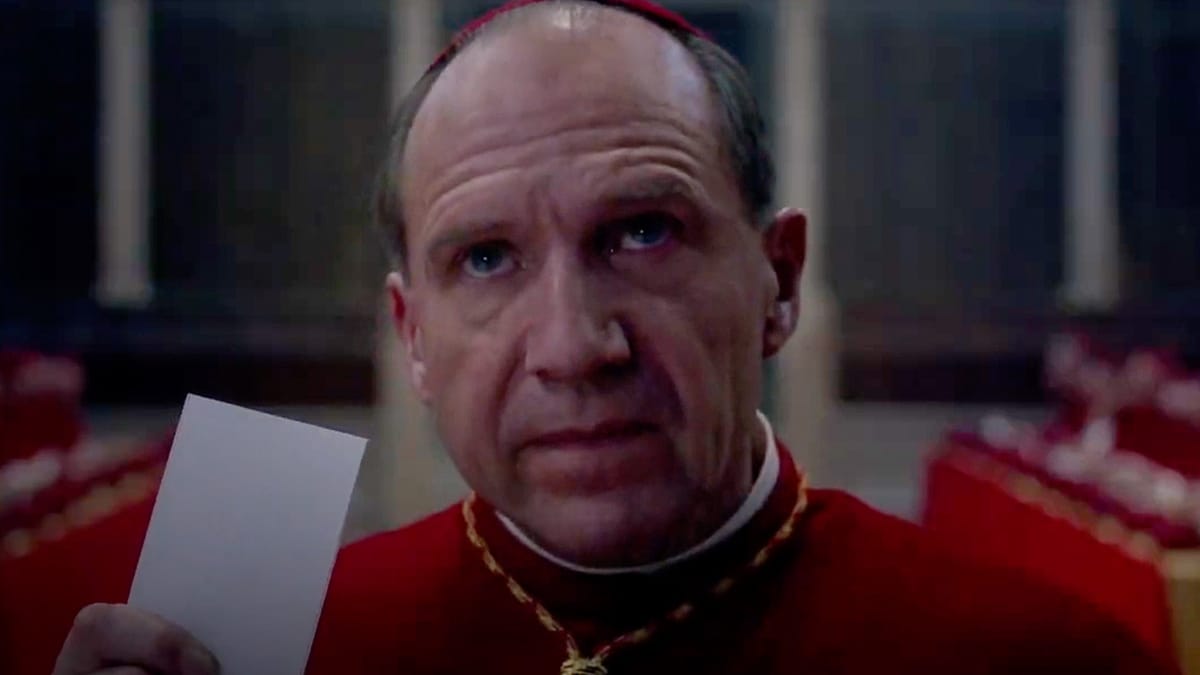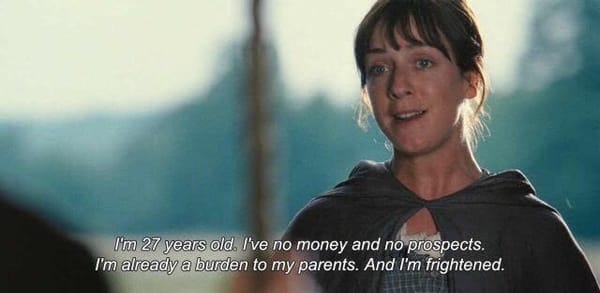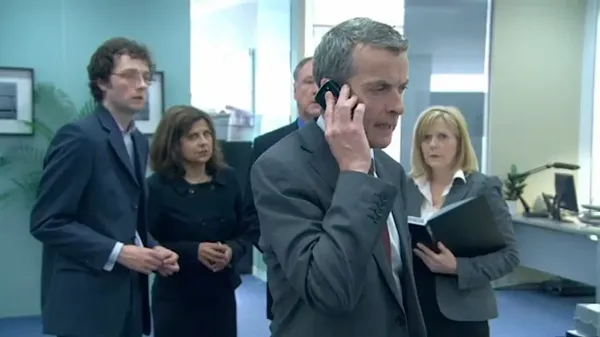Conclave's Ending: Treating a Twist as a Revelation
A well-executed twist leaves an audience feeling like a story makes more sense now that they know this new information. We'll unpack how Conclave's ending doesn't upend the story, but fulfills the promise of its premise.

Don't just call it a twist.
A well-executed twist leaves an audience feeling like a story makes more sense now that they know this new information. Poorly executed twists either confuse the audience about how we got here (Events before the twist don't make sense now), or feel anti-climactic (How is the twist or the events afterward surprising to the characters?).
Let's unpack how Conclave's ending doesn't upend the story that came before, but fulfills the promise of the premise.
Setting story expectations in screenwriting
Conclave takes the audience inside the election of a new pope. There are a few key questions the movie seems to promise the audience it will answer:
- Who will be the next pope?
- How (and why) will they be chosen by the other cardinals?
Cardinal Lawrence (Ralph Fiennes) is in charge, and we are told that we should already rule him out as a possible winner:
- He doesn't want the job (or at least he has accepted the previous pope's opinion that he would be ill suited for the job)
- There are other candidates who are consolidating voters, and each represent different points on the progressive <-> traditionalist spectrum
- These include Lawrence's favorite, Cardinal Bellini (Stanley Tucci), as well as the other contenders, Cardinals Adeyemi (Lucian Msamati), Tremblay (John Lithgow), and the leading conservative/traditionalist Tedesco (Sergio Castellitto)
- Lawrence thinks winning an election he's running would look bad, regardless of its legitimacy.
- Lawrence is having a crisis of faith, seeing certainty as a sin and recognizing that many of the leading candidates are men calling for a return to tradition, rigidity, and certainty.
In his initial benediction to the conclave, the audience sees Cardinal Lawrence as a man conflicted. He both wants to shift the church in a more progressive direction, but also refuses to push his thumb too forcefully on the scales:
But wait, there's (one) more!
Cardinal Benitez (Carlos Diehz), arrives late to the conclave (almost getting himself locked out), and identifies himself as the Archbishop of Kabul.
The central questions around Benitez echo the questions about the entire conclave:
- Who is this stranger?
- How did nobody know about him?
- Why did the previous pope keep him a secret?
As Cardinal Lawrence investigates, these questions become more concrete and specific:
- Is Benitez actually the Archbishop of Kabul?
- Why did the previous Pope name him cardinal in pectore (basically, in secret)?
- Why was there a conversation between the former Pope and Benitez about Benitez requiring a medical procedure in Switzerland (that Benitez refused)?
This mystery is introduced like a separate line of inquiry, in part because all the voting cardinals know nothing about this person, so it's out of the question that he could be elected.
It's the interplay of these plotlines that creates possible explanations for the audience to believe in.
Not what you were expecting
Gradually, all of the obstacles that prevent the audience, and Cardinal Lawrence, from seeing Lawrence as the possible new pope are moved aside:
- Nearly all of the front runners lose on early ballots due to a range of scandals and schemes that Lawrence helps bring to light.
- Lawrence does not actively encourage anyone to vote for him, but eventually he begins receiving votes (making him feel less uneasy about both the prospect of the job and the appearance of his potential victory).
- Lawrence learns from Cardinal Benitez that he was the first one to vote for Cardinal Lawrence.
This last detail helps suggest a red herring. At the beginning the audience was told not to count on Lawrence as the new pope, and it seems that the mystery player, Benitez is crucial to changing that impossibility to an improbability. It creates a credible answer for what will happen, and where pieces could fit together.
The audience may ask themselves, "Will Cardinal Lawrence renew his faith on his way to becoming pope?"
There is some slight of hand happening. The build up we're told to pay attention to is the coming showdown between traditionalist Cardinal Tedesco and Cardinal Lawrence, the reformer. All the other major pieces are swept off the board.
And then a bomb goes off.
Building towards the twist: structure & setup
It's literally a car bomb. The situation outside the conclave is chaotic, but the Cardinals have been so isolated it hasn't been clear to what degree. And when the bomb is perfectly timed with Lawrence casting a vote for himself, and the blast opens a hole in the roof so a symbolic ray of light shines down upon him, this is no Deus ex machina (as appropriate as that might seem).
But the bomb itself isn't the twist, and it doesn't resolve the central questions of the story. It's the reactions to the bomb by the cardinals that solidifies who will have the votes needed to become the next pontiff.
- Lawrence reads the facts of a series of terrorist attacks taking place in multiple cities in Europe. It is factual, but cold and fails to give direction.
- Tedesco uses this as an opportunity to attack the liberal branch of the church for being weak and accommodating of other faiths, going so far as to call for a holy war against Islam.
- Cardinal Benitez stands and silences the room by describing his experiences with actual war in the Congo, Baghdad, and Kabul. He shuts down Tedesco and reframes the entire conversation by pointing out the pettiness of the fights among the Cardinals.
Cardinal Benitez was right there the whole time. He was pointed out to the audience, given a clear backstory through Lawrence's investigation, and a clear need to stand up and speak in that moment because of all we know about him already. Benitez is practically holding the keys to the Popemobile at the end of that scene.
Here comes the twist: fulfilling your premise
And Lawrence sees him as a fine choice, if unexpected, until a lingering question reappears. What was that procedure in Switzerlnd that Benitez refused?
Benitez was born with ovaries and a uterus, and he chose not to have them removed. He says it would be a rejection of how God made him.
It allows the audience to get a deeper understanding of Cardinal Benitez's compassion for others as well as people who have been "othered."
Instead of Lawrence going to work to avert another scandal, this new information fulfills Cardinal Lawrence's earlier request for a Pope who doubts, and who is comfortable with a lack of certainty. It affirms his faith, and this unlikely outcome fulfills his desires at the beginning of the story.
A few takeaways
- A well-executed twist keeps probable expectations in play. For example, Tedesco starts as a strong candidate and continues to gain support throughout the story, keeping him a valid contender.
- Cardinal Lawrence taking himself seriously as a candidate primes the audience for a specific twist of expectations from the beginning. The audience can take hold of this as their expectation of the twist, allowing for building up the actual twist without being too obvious.
- A twist needs to be good on the second viewing. If you know it going in, does the story still work?




